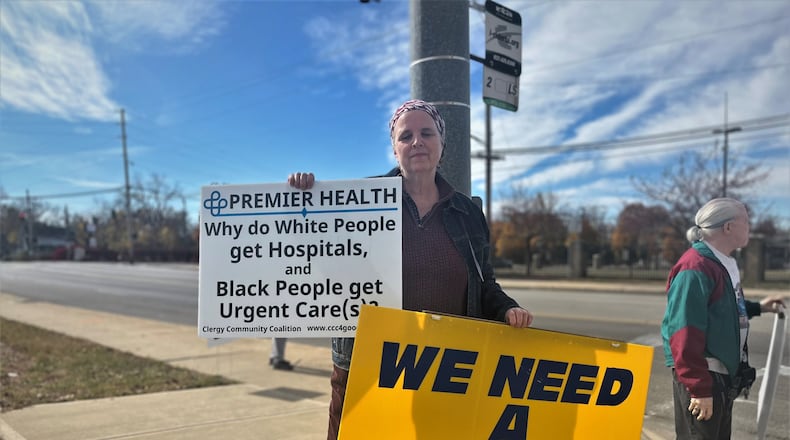The Clergy Community Coalition this week turned in a petition to the Dayton clerk of commission that contains about 1,590 signatures. Dayton’s charter says citizens can submit a proposed ordinance for city commission consideration if they get signatures from at least 1,250 registered voters in the city.
The ordinance proposed would require a 10-year, 1-mill property tax levy to be placed on the ballot at the next regularly scheduled election, to generate revenue to construct and operate a new public hospital in West Dayton. The petition language says the hospital would either be wholly owned and operated by the city of Dayton, or operated in partnership with another city, county, or township.
Clergy Coalition members for years have condemned the 2018 closing of Good Samaritan Hospital in northwest Dayton. Premier Health shut down the hospital, claiming that the hub of health care services in northwest Dayton was underutilized and not financially sustainable.
Today on that site, there is a Northwest Health and Wellness Campus within the Premier Health YMCA. It offers an urgent care center open 12 hours, six days a week, plus some physical therapy and x-ray services, a diabetes center, a cardiovascular institute, and a lab services office.
The Clergy Community Coalition’s proposed ordinance opens with four straight paragraphs of the city commission’s own language outlining disproportionate health outcomes for African Americans, the fact that west and northwest Dayton have the highest concentration of Black residents, and that the city of Dayton in 2020 declared racism a public health crisis and vowed to adopt an anti-racist lens in city policy.
Credit: JIM NOELKER
Credit: JIM NOELKER
Regina Blackshear, Dayton’s clerk of city commission, said the coalition’s petition has been sent to the Montgomery County Board of Elections for validation.
Blackshear said she presented the petition to the city commission on Wednesday and she has scheduled a public hearing for this matter two weeks from now, on Wednesday, Aug. 7.
“We are hoping that, during that meeting, we will get a favorable vote from the city commission and move forward with the ballot initiative and put it on the ballot for Nov. 5, 2024,” said Bishop Richard Cox, president of the Clergy Community Coalition.
Complicated process
The upcoming process appears to have detailed requirements spelled out in Dayton’s city charter.
According to the city charter, if the petition fulfills the signature requirement, then the city commission must “take final action” on the petition within 30 days, which would be around Aug. 23.
But “final action” doesn’t mean city commission has to approve putting the tax levy on the ballot. If commission rejects or changes the petition, the petitioners have another option, according to the charter. In that case, they can guarantee that the proposed ordinance would go before voters if they obtain 1,250 additional signatures of registered voters in the city who did not sign the original petition.
That extra step raises the issue of whether the coalition could get that done in time for the November election. In most jurisdictions, issue votes like this have to be submitted to the board of elections 90 days before an election (4 p.m. Aug. 7 for this November). Dayton’s city charter language refers to putting an approved ordinance on the ballot “at the next general election if one shall occur not less than 60 nor more than 120 days after its passage.”
A deadline 60 days before the election would be around Sept. 5.
Funding and tax details
The 1-mill levy, if approved by voters, would generate about $2 million annually and would cost the owner of a $100,000 home in Dayton $35 per year in most cases, according to the coalition.
Rockney Carter, a pastor and a member of the Clergy Community Coalition, on Wednesday urged the city’s elected leaders to give the proposed ordinance fair and serious consideration.
He said a state-of-the-art public hospital would be very beneficial for West Dayton residents.
“I thank you in advance for acting upon this in a positive and affirmative way,” he said.
Mayor Jeffrey Mims Jr. on Wednesday congratulated the coalition for its efforts. City Commissioner Shenise Turner-Sloss praised the coalition, saying, “Thank you for rolling up your sleeves and for finding a solution for what we’ve experienced in the matter of the loss of a hospital in the (northwest) Dayton area.”
“Once they (the city commissioners) pass it, we campaign for it,” Cox said. “If the voters vote for it, we would probably start getting the money in 2025 or early 2026.”
Residents would see planning stages begin in about five years or less, he said.
If the measure is approved by the city commission and voters, the coalition plans to seek funding from county, state and federal sources, as well as from private donors, Cox said.
Additionally, the board of the hospital would be run by the mayor, who would also appoint additional members to the board, Cox said.
“They have to reflect different people in the community,” Cox said about the board members for the proposed public hospital.
Jobs and health services
The hospital would operate the same way that MetroHealth is operating in Cleveland, he said. They also expect to create jobs with the implementation of this hospital.
“We might be able to bring 4,000 or 5,000 jobs to the city if we could get this started,” Cox said.
The hospital would be a help to some of the city’s more vulnerable residents, such as those with financial or physical challenges, but also to the city as a whole, he said.
“It will serve all of the residents in the city of Dayton, and it would be a great asset to the community economically,” Cox said. “It would also be a great asset that people would be served regardless of their insurance status, whether they had insurance or not, they would still be getting affordable and adequate health care.”



